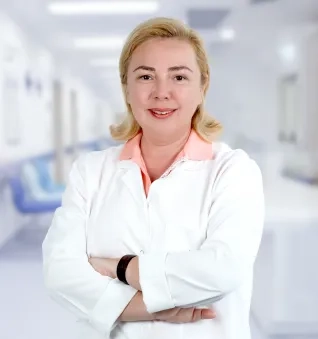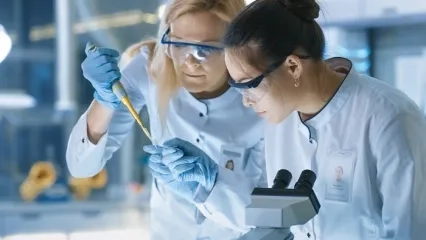Alo Yeditepe
Alo Yeditepe
Paternal Prostate Cancer is a Risk Factor for Breast Cancer in Daughter
Medical geneticist and academician Ayşegül Kuşkucu, M.D., states that 10 percent of breast cancer cases are hereditary. Emphasizing that breast and ovarian cancer are inherited not only from female relatives but also from male relatives, Doctor Kuşkucu says “History of prostate cancer in father and close male relatives should provoke a high-index suspicion for hereditary cancer.”
Expressing that genetics play a role in all cancers, Lecturer Ayşegül Kuşkucu, M.D., Head of Medical Genetics Department of Yeditepe University Koşuyolu Hospital, highlights important details about correlation of cancer with genetics. Explaining the difference between genetic and hereditary cancer, Lecturer Ayşegül Kuşkucu, M.D., adds: “All cancers are genetic diseases, because a healthy body cell deviates from its normal course and transforms into a cancerous cell, when a gene that functions normally in the cell is somehow disrupted. In other words, a person is born and lives healthy, but changes in genes of certain tissues or organs lead to onset of cancer thereafter. However, hereditary means something different. In hereditary cancers, a child is born with some disorders in a certain group of genes, called mutation, and these mutations increase the risk of cancer when compared to healthy people; moreover, said gene mutation may transmit the risk of cancer to next generations. A very small part of cancers are hereditary. Approximately 10 percent of prevalent cancers are hereditary, such as breast cancer. We call them hereditary breast and ovarian cancers.”
Hereditary Breast-Ovarian Cancers Begin in 3 Tissues
Expressing that tumor suppressor genes usually play a role in hereditary cancers, Lecturer Ayşegül Kuşkucu, M.D., adds: “These genes function to suppress and prevent formation of any tumors in the body. However, certain mutations in tumor suppressor genes, such as BRCA1 and 2, may, sometimes, lead to certain unique cancers. These are breast and ovarian cancers. Mutation in these genes can be transmitted to next generations in the family. The mutation is carried by each cell of the body in the person with the mutation. Cancer can be detected in 3 tissues of the body, especially the prostate gland in men.”
Cancer Does not Always Begin in a Person with the Mutation
Lecturer Kuşkucu, M.D., explains that not all BRCA mutations will lead to cancer; “One out of every 8 women is a candidate for breast cancer. This is an extremely high rate. However, we expect to detect the onset usually above the age of 40. On the other hand, it is necessary to act skeptically, if there is a family member with breast cancer that began around 30 years of age. Is there a predisposing environmental factor? Or, is there an inherited mutation? In such cases, it is necessary to act more carefully. A hereditary pattern seems more likely, if family history is notable for breast cancer at a younger age or breast cancer in more than one family member. If one carries the mutation, it does not necessarily mean that cancer will develop. It implies that the risk is higher in comparison to the general population and it is necessary to start follow-up at an earlier age. In families for whom hereditary cancer is suspected, the family member with documented cancer should, first, be assessed, if possible; if mutation is detected in the family member who was diagnosed with cancer, healthy family members are screened who are at risk. A tailored risk analysis is done for each family with the mutation. Therefore, one should absolutely visit a Medical Geneticist and genetic counseling should be requested.”
Both Paternal and Maternal History Should Be Reviewed When Breast Cancer is Detected
Clarifying that the history of prostate cancer in father and close male relatives (grandfather, paternal uncle, brothers, etc.) is also relevant for familial breast and ovarian cancers, Lecturer Kuşkucu, M.D., adds:
“The genes are thought to be passed on to the next generations only by women. However, father and paternal relatives are also likely inherit the mutations of genes. Therefore, both maternal and paternal histories should be reviewed well, if a hereditary cancer is suspected. For example; a hereditary cancer should be considered, if the father is diagnosed with prostate cancer and the paternal grandmother has history of ovarian cancer diagnosed at an earlier age. It is not possible to conclude that these cancers are always passed on by mother and maternal relatives. Hereditary cancers can be inherited by either parent and parental relatives. Therefore, it is necessary to question history of both maternal and paternal relatives for people who are considered at risk for breast cancer.”
About
Faculty and Year of Graduation:
Istanbul University Faculty of Medicine, 2001
”
See Also
- What is Genetic Testing? In Which Situations Is It Performed?
- Genetic Tests in Cancer
- The Game of Chromosomes
- Cancer Predisposition Can Be Determined With This Test
- Genetic Testing Directs Our Health
- The Vicious Cycle of Generations with SMA Can Be Overcome with Screening Tests
- Genetic Diseases Can Be Detected by a Blood Test in the Womb
Alo Yeditepe





